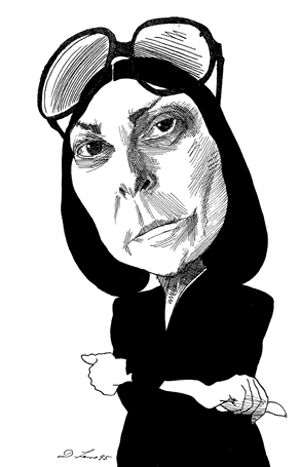In 1994 Janet Malcolm wrote a profile of the artist David Salle that takes an unusual form and is one of the few works of nonfiction published in The New Yorker that could be said to be experimental. “Forty-one False Starts” is composed, as the titles suggests, of forty-one very short sections, many of them only one or two paragraphs long, that trail off or dead-end before a new one begins. Any one of these sections could have been a plausible opening for the piece. Most of them introduce “the artist David Salle” as if for the first time:
“All during my encounter with the artist David Salle—he and I met for interviews in his studio, on White Street, over a period of two years—I was acutely conscious of his money,” begins part 3.
“The artist David Salle and I are sitting at a round table in my apartment,” begins part 5.
“During recent talks I had with the painter David Salle, who was one of the brightest art stars of the eighties, he would tell me—sometimes in actual words, sometimes by implication—that the subject of his declining reputation in the art world was of no real interest to him,” begins part 16.
What might have been a problem—Malcolm’s inability to settle on a unified perspective or a consistent tone—becomes an ingenious method. The repetition of “the artist David Salle” is unexpectedly invigorating, a jolt of energy on every page. Who needs middles and ends when you can have so many fresh beginnings? You soon realize that the form of the profile echoes some of the qualities Malcolm finds in Salle’s work. “Nothing is ever resolved by Salle, nothing adds up, nothing goes anywhere, everything stops and peters out.”
But her profile does go somewhere. The abortive sections overlap and complement one another, building up significance. A vision of Salle, a sense of his work, and a view of the seething art world of the 1980s and 1990s emerge through accretion. A paradox: out of only beginnings, she composes something that feels as though it has a beginning, middle, and end. As she says of Salle’s paintings, once you’ve seen work like this, more conventionally composed pieces “seem pale and meager, kind of played out.”
Malcolm was more famous for her critical stringency than for formal experiment. She raised pointed questions about exploitation (by psychoanalysts, journalists, biographers) of people with less power (patients, interview subjects, the dead). She was drawn to rarefied professional worlds that she explained to outsiders in the juiciest way possible: by chronicling their intramural quarrels, alert to the pomposity and self-delusion. She was working novelistic territory that actual novelists of the 1980s, 1990s, and 2000s mostly left up for grabs. In books like The Silent Woman (about Sylvia Plath’s warring biographers) and In the Freud Archives (about a feud among elite psychoanalysts over interpretations of Freud), she shares some of the deeper energies of Philip Roth in the era of The Counterlife and Operation Shylock: a love of the play of counterfactuals, jarring perspective shifts, and plausible conflicting testimonies.
The range of allowable moods in the Salle essay is wider than in the carefully managed, positive atmosphere of most profiles, in which the journalist is cheerfully game while the successful artist shows himself to be practiced in gratitude. If Malcolm is the orchestrator of the piece, she nonetheless puts before us evidence that her own views are changeable—regarding Salle, she may be skeptical, admiring, disapproving. In a conventional profile the wayward views would have been edited out in order for the remaining pieces to create a sense of unerring progression, solidifying the writer’s authority. Instead, the very structure of Malcolm’s essay invites the reader to doubt, and draws attention to the subjectivity and contingency of profile-writing itself.
Malcolm was, I think, more playful about her authorial identity than she’s given credit for. Her self-implications are built into the structure of her work. It’s funny, a journalist’s pronouncing journalism morally indefensible. Here she is snooping in Ted Hughes’s front yard after he has already indicated that he doesn’t want to meet with her. There she is being sued by her subject for libel and losing the notebook (losing the notebook!) that would have helped her case. “The gods enjoyed their joke,” Malcolm writes, describing her rediscovery of the notebook on her own bookshelf soon after ten years of protracted legal proceedings had finally concluded in her favor. I can’t say what tribute the gods are due, but the “Janet Malcolm” who appears across the books and essays of Malcolm’s long career is a character in a very subtle comedy, a comedy so discreet you might miss it.
Advertisement



